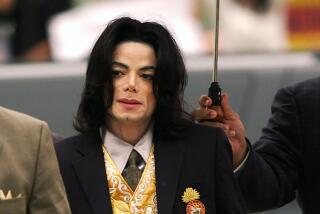Hefty fine in Jackson taping
- Share via
The owner of a celebrity jet service who secretly videotaped Michael Jackson talking with his lawyers while the singer flew from Las Vegas to Santa Barbara to turn himself in to face child molestation charges in 2003 was ordered to pay $20.25 million to the pop star’s attorneys.
The order by Los Angeles County Superior Judge Soussan G. Bruguera, made public Monday, followed a two-week bench trial held in January 2007.
Bruguera ordered XtraJet, based in Santa Monica, and its owner Jeffrey Borer to pay the bulk of the money -- $18 million -- to attorney Mark Geragos. The remainder is to be paid to Geragos’ associate, Pat Harris.
The two were recorded as they talked with Jackson during the flight.
The tapes came to light in November 2003 when Fox news said it had been approached by someone offering to sell tapes of Jackson talking with Geragos.
Jackson was later acquitted of the child molestation charges.
Borer and an associate have since pleaded guilty to federal charges of conspiring to secretly record Jackson as he talked with his attorneys.
Borer again made headlines last year when it was reported by The Times that he was serving his home detention sentence in the case at the Ritz Carlton in Marina del Rey.
Borer was confined to the five-star hotel for six months at his own expense after telling the court that his home was infested with mold, to which his wife was allergic.
The majority of the civil judgment released Monday -- $18 million -- was in the form of punitive damages.
“The question in this case was whether it’s worth it to violate people’s privacy,” said attorney Brian Kabateck, who represented Geragos and Harris.
“The court sent a clear message that the cost far outweighs the benefit.”
Borer’s attorney, Lloyd Kirschbaum, said he would appeal the court’s decision.
He said since the tape has no audio it did not violate the attorney-client privilege -- the reason for such large punitive damages -- and the fact that it was never released should heavily reduce any actual damages.
“The judgment is based on a flawed premise,” he said.
--



